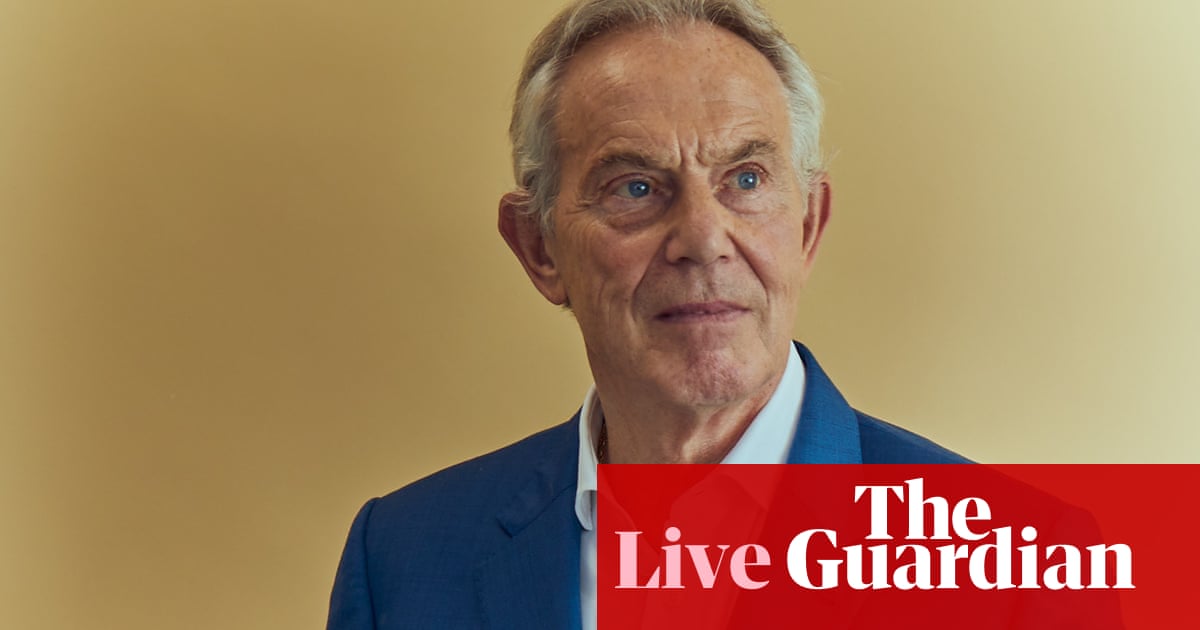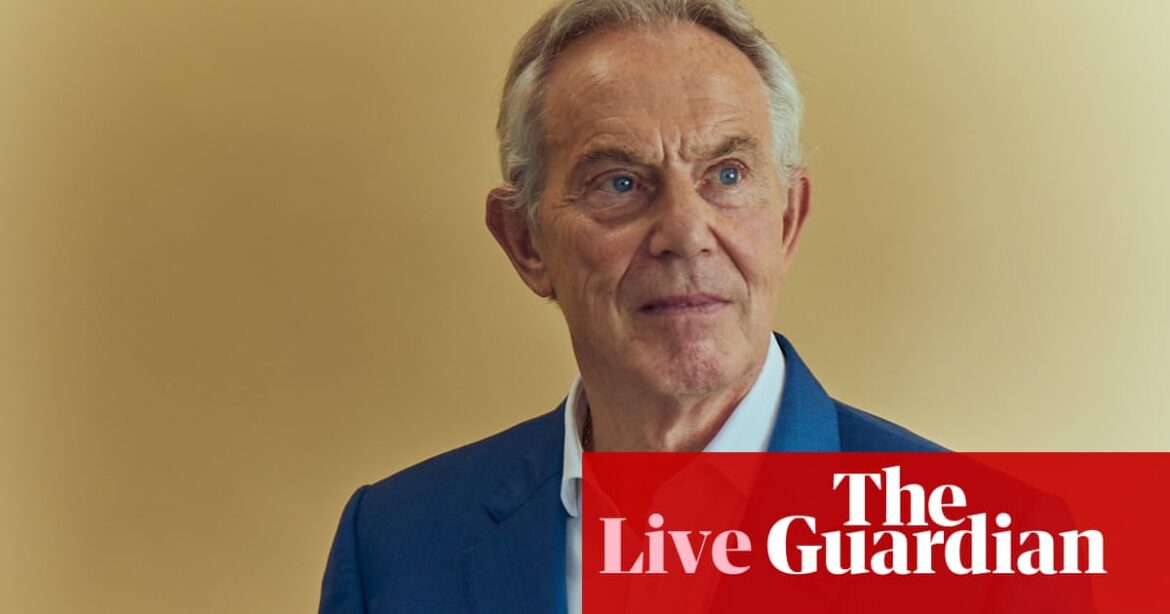
Blair, who was writing the foreword to a new report from his thinktank, the Tony Blair Institute, echoed similar criticism of net zero made by the Conservative leader Kemi Badenoch. He wrote “any strategy based on either ‘phasing out’ fossil fuels in the short term or limiting consumption is a strategy doomed to fail.”
The former Labour leader, whose institute has been highly influential in Labour circles, said that the current climate debate was “riven with irrationality” and suggested net zero was losing public support.
The paper itself, written by the TBI’s Lindy Fursman, said that net zero policies were now being seen as “increasingly viewed as unaffordable, ineffective, or politically toxic”.
In the UK however, climate change policies have retained popularity. The thinktank Persuasion UK said in a report published yesterday that Labour could potentially lose far more seats from disillusioned leftwing Labour voters defecting to the Greens than from those defecting to Reform.
Last week Keir Starmer told conference in London that tackling the climate crisis and bolstering energy security were “in the DNA of my government” and that “we won’t wait – we will accelerate.”
But Blair said that present policy solutions were “inadequate” and said leaders should shift towards a “pragmatic policy” that prioritised technological solutions. He said this was borne out by rising demand for production of fossil fuels, especially in China and India and the doubling of airline travel plus increased demand for steel and cement.
He said he still believed climate was “one of the fundamental challenges of our time” and that renewable energy was necessary. But he said the government needs “to alter where we put our focus”.
Blair said there should be more focus on carbon capture, saying: “The disdain for this technology in favour of the purist solution of stopping fossil-fuel production is totally misguided.” He also called for a major new international embrace of nuclear power and to intensify work on new small modular reactors.
n its splash story on the power cuts in Spain and Portugal, Kemi Badenoch said she thought it was likely that having a grid reliant on renewable energy was a factory.
She told journalists:
I’ve heard different theories about what’s happened.
Some have said that it’s cyberterrorism, but the more likely issue is the grid – that when you have an electricity supply that’s reliant on renewables, you need a lot of battery storage. And quite often, what we’re seeing is renewables running ahead of the storage facilities, which means that when you have surges one way or another, you end up with blackouts.
And this is one of the reasons why I’ve been saying that the net zero plans we have are not thought through.
But Dowing Street said these were “unfounded claims”. At the afternoon lobby briefing, asked about the theory that there was a renewable energy link to the power cuts, a No 10 spokesperson said:
In terms of the claims of reliance on net zero energy leaving countries affected vulnerable to power cuts, these are unfounded claims and speculation at this stage.
It is too early to confirm the exact cause of the incident, and the priority has obviously been the restoration of power.
Switching fossil fuelled generation for home grown, clean energy from renewables and other clean technologies offers us security, electricity supply that fossil fuels simply cannot provide.
3.05pm.) Farage posted this on social media.
Even Tony Blair now says the push for Net Zero has become ‘irrational’ and ‘hysterical’.
We are winning the argument!
reports, three MSPs (two Tory, and one Labour) voted to remove her, but they were outvoted 4-3 after three SNP MSPs voted to back Chapman, who also voted for herself.
Chapman accused the supreme court of “bigotry, prejudice and hatred”, which led to Scotland’s Faculty of Advocates accusing her of underming the independence of the judiciary.
it might recognise the Palestinian state in June.
Thornberry, chair of the Commons foreign affairs committee, asked if the government agreed “that now is the time to take the next serious step which is to finally recognise the state of Palestine and perhaps the best time to do that might be alongside the French in New York in June?”
Falconer said the government’s position on this had not changed. He went on:
We do wish to recognise a Palestinian state, we wish to do so as a contribution to a two state solution and we will make a judgment about when the best moment is to try and make the fullest possible contribution.
Because as I said to the Palestinian prime minister this morning, our responsibility is for the reality of the situation on the ground, the practical viability of a Palestinian state.
Of course there are other states that have taken a different position from the UK government and chosen to recognise a Palestinian state. That has not called it into existence. Our job in the British government is to make a practical contribution to a two state solution and that is how we intend to approach this issue.
Kneecap.
An urgent question is a means of getting a minister to make a mini-statement on a topic, and the actual question tends to be very bland. In this case, it was: “To ask the secretary of state for the home department if she will make a statement on the alleged incitement to murder MPs by the Irish Republican group Kneecap.”
Conservatives have welcomed Tony Blair’s criticism of current net zero policies. Andrew Bowie, the acting shadow energy secretary, said:
It seems even Tony Blair has come to the realisation that Keir Starmer and the Labour party’s mad dash to net zero by 2050 is simply not feasible, or sustainable.
As Ed Miliband’s net zero zealotry pushes this country’s energy security even further into the arms of China, and their slave labour supply chains, and risks driving up energy bills further and further, only Kemi Badenoch and the Conservatives are telling the truth about energy policy in this country.
Under new leadership, we have been clear that the cost of net zero by 2050 to families will be far too high, and we must urgently change course. Will Labour now finally be prepared to do the same, and put the national interest above their own ideological dogma?
Blair’s comments in foreword to the report published his thinktank (see 3.05pm) do not directly refer to UK government policy. His remarks refer to climate policy in developing countries in general. But the points he is making clearly apply to the UK.
the report that his thinktank has published. (See 1.10pm.)
Though most people will accept that climate change is a reality caused by human activity, they’re turning away from the politics of the issue because they believe the proposed solutions are not founded on good policy.
Blair does not cite evidence at this point to back up this claim, and it is at least arguable. Polling suggests that, in the UK, at least some aspect of the net zero agenda are popular. For example, YouGov published a poll recently saying more than half of Britons support the government’s target of getting emissions to net zero by 2030. The government carries out its own tracker polling, and that shows 54% of people think the transition to net zero will have a positive impact on the economy over the long term.
In developed countries, voters feel they’re being asked to make financial sacrifices and changes in lifestyle when they know that their impact on global emissions is minimal. Whatever the historical responsibility of the developed world for climate change, those with even a cursory knowledge of the facts understand that in the future the major sources of pollution will come principally from the developing world.
This is quite similar to what Nigel Farage was arguing only last week.
For that developing world, there is an equal resentment when they’re told the investment is not available for the energy necessary for their development because it is not “green”. They believe, correctly, that they have a right to develop and that those who have already developed using fossil fuels do not have the right to inhibit them from whatever is the most effective way of developing.
Because of the levels of growth and development, present policy solutions are inadequate and, worse, are distorting the debate into a quest for a climate platform that is unrealistic and therefore unworkable.
So, the movement now needs a public mandate, attainable only through a shift from protest to pragmatic policy. Too often, political leaders fear saying what many know to be true: the current approach isn’t working.
(The line about politicians not saying “what many know to be true” sounds like an extract from a Kemi Badenoch speech. In fact, she would probably agree with almost all of what Blair is saying in this foreword.)
Despite the past 15 years seeing an explosion in renewable energy and despite electric vehicles becoming the fastest-growing sector of the vehicle market, with China leading the way in both, production of fossil fuels and demand for them has risen, not fallen, and is set to rise further up to 2030. Leaving aside oil and gas, in 2024 China initiated construction on 95 gigawatts of new coal-fired energy, which is almost as much as the total current energy output from coal of all of Europe put together. Meanwhile, India recently announced they had reached the milestone of 1 billion tonnes of coal production in a single year.
Airline travel is set to double over the next 20 years.
By 2050, urbanisation is expected to drive a 40 per cent increase in demand for steel and a 50 per cent increase in demand for cement – core inputs to development, but materials with a significant emissions footprint.
These are the inconvenient facts, which mean that any strategy based on either “phasing out” fossil fuels in the short term or limiting consumption is a strategy doomed to fail.
Blair does not define “short term” in this context.
We need to recognise that without turning some of the emerging technologies into financially viable options, the world will choose the cheapest option. This applies to everything from nuclear fusion to sustainable aviation fuel, to green steel and low-emissions cement.
We should put carbon capture – directly removing carbon as well as capturing it at source – at the centre of the battle. At present, carbon capture is not commercially viable despite being technologically feasible – but policy, finance and innovation would change this. The disdain for this technology in favour of the purist solution of stopping fossil-fuel production is totally misguided.
Nuclear power is going to be an essential part of the answer. The confusion of this with nuclear weapons and consequently the irrational fear of it, intensified by hyperbolic campaigning, has led the world to an egregious policy error with many countries turning their back on it from the 1980s onwards, when embracing it would have significantly changed the trajectory of global emissions. The new generation of small modular reactors offers hope for the renaissance of nuclear power, but it needs integrating into nations’ energy policy.
And adaptation to climate change must also move up the agenda because the impacts that are already locked in cannot all be mitigated in the time available. But adaptation has always been the poor relation of climate action because it seems to accept that some climate change is inevitable.
This is also an argument that Badenoch has made.
[At Cop summits] political leaders argue for days in public about wording like “ending”, “phasing out”, “reducing” fossil fuels, proclaiming that we can still meet the 1.5 degrees target on limiting global warming, about who bears “responsibility” for climate change, and “loss and damage” compensation, in a forum that frankly doesn’t have the heft to drive action and impact.
Because – agree with it or not – most political leaders are decent people who do want to do the right thing, in recent times the Cops have become uncomfortable for many leaders. They would like to start taking some of the hysteria out of the climate debate but are reluctant to be the first to do so.
The Cop process will not deliver change at the speed required. The great gathering of all the nations has its place though probably not every year. But the reality is that it is the decisions of the large countries, and the policy direction they give towards the technology and the financial flows, which can in truth solve the climate issue. This is what will decide whether we begin to match our noble ambitions to protect the planet with the necessary actions to achieve them.
Kneecap would never again receive any public money.
In response, Jarvis said the government was reviewing the music export growth scheme, under which Kneecap was awarded a £14,000 grant in the first place.
He went on to say:
It does seem strange to me, and I’m sure to other members of this house, that a Republican group, seemingly opposed to the British government in the first place, would want to receive funding from it.
(Jarvis may have forgotten that, while Sinn Féin MPs do not receive a salary from the British state, because they don’t take their seats, the Commons rules were changed in 2001 to allow them to receive parliamentary expenses. The party also gets Short money – government funding for opposition parties.)
Dan Jarvis, he asked why they government is not appealing against the court decision saying the last government was wrong when it decided to block a government grant to Kneecap worth £14,000. He asked Jarvis to name the minister responsible for this decision, which he described as a “surrender”.
And he asked if Jarvis agreed that it would be “unconscionable” for Kneecap to appear at Glastonbury this year, at least while a police investigation is underway.
Jarvis said he did not accept that way Francois characterised the grant decision. He said the last government approved the grant, and then withdrew it without taking proper legal advice. He says the new government did not contest the court decision because it did not want to end up in a costly legal battle.
The government is now reviewing the scheme under which the grant was given, he says.
Referring to the Glastonbury invitation, Jarvis says it is not for the government to decide who performs at the festival. But he goes on:
There is an on-going live police investigation. So the government would urge the organisers at the Glastonbury festival to think very carefully about who is invited to perform there later this year.
Jarvis did not name the band in his response to Francois, or in his opening statement. He said he had chosen not to name them deliberately to avoid giving them further publicity.
9.58am.)
Jarvis starts by recalling Jo Cox and David Amess – two MPs murdered within the last decade.
He says the Kneecap comments were “dangerous and irresponsible” and he says the the government utterly rejects the views expressed.
Let me be crystal clear, political intimidation and abuse have no place in our society.
Jarvis says the Kneecap video is being investigated by the police. The the investigation and prosecution of offences is a matter for the police and the Crown Prosecution Service. He says they should be allowed to carry out their work without political interference.
Through the Defending Democracy taskforce, the government is working on measures to protect politicians, he says. He concludes:
We may not always agree, but if there is one universal truth we would all subscribe to, it is surely that our politics is better when it is conducted respectfully and safely.
Scotland editor.
Anas Sarwar, the Scottish Labour leader, appeared to describe the Israeli leader Benjamin Netanyahu as a “despot” before rowing back after being asked whether he believed that was accurate.
Sarwar began ad libbing as he delivered a speech to the Scottish TUC’s annual congress in Dundee about wars and violence around the world, when he paid tribute to:
Those struggling in Gaza and the humanitarian catastrophe that continues and the ongoing bloodshed from a regime led by Benjamin Netanyahu that doesn’t seem to understand or respect international law.
Or whether it be those suffering in Ukraine at the hands of another despot in the name of Vladimir Putin, or indeed those that are suffering in the ongoing violence in Sudan, and the many, many other places where there are heightened tensions or the risk of war.
Speaking to reporters after his speech, Sarwar qualified those remarks. He said:
I talked about despotic regimes in Russia. Benjamin Netanyahu is a democratically elected prime minister.
I believe Benjamin Netanyahu is a war criminal. I believe he is flouting international law in his actions in Gaza, but he is a democratic elected prime minister of Israel.
Asked if he misspoke, Sarwar added:
Well I called Vladimir Putin a despotic regime and leader. Our challenge, if we are going to see a peaceful resolution in the Middle East [is] yes, we have to see the end of violence.
Yes, we have to see a ceasefire. Yes, we have to see the immediate release of hostages, but we also have to see a change in the political circumstances in the Middle East, because ultimately, we need two sides that are willing to negotiate and willing to come to a peaceful resolution and a two-state solution.
At the moment, I don’t get an impression that that’s a position that Benjamin Netanyahu supports, and that’s why he continues to flout international law; continues to starve the people of Gaza in many ways, continues the bloodshed of innocent individuals, and that’s why, I think it demonstrates we need a different approach.
The International Criminal Court has issued an arrest warrant for Netanyahu over war crime allegations. Israel does not accept these charges.
Labour and in industry, the former prime minister said people were “being asked to make financial sacrifices and changes in lifestyle when they know that their impact on global emissions is minimal”.
Blair, who was writing the foreword to a new report from his thinktank, the Tony Blair Institute, echoed similar criticism of net zero made by the Conservative leader Kemi Badenoch. He wrote “any strategy based on either ‘phasing out’ fossil fuels in the short term or limiting consumption is a strategy doomed to fail.”
The former Labour leader, whose institute has been highly influential in Labour circles, said that the current climate debate was “riven with irrationality” and suggested net zero was losing public support.
The paper itself, written by the TBI’s Lindy Fursman, said that net zero policies were now being seen as “increasingly viewed as unaffordable, ineffective, or politically toxic”.
In the UK however, climate change policies have retained popularity. The thinktank Persuasion UK said in a report published yesterday that Labour could potentially lose far more seats from disillusioned leftwing Labour voters defecting to the Greens than from those defecting to Reform.
Last week Keir Starmer told conference in London that tackling the climate crisis and bolstering energy security were “in the DNA of my government” and that “we won’t wait – we will accelerate.”
But Blair said that present policy solutions were “inadequate” and said leaders should shift towards a “pragmatic policy” that prioritised technological solutions. He said this was borne out by rising demand for production of fossil fuels, especially in China and India and the doubling of airline travel plus increased demand for steel and cement.
He said he still believed climate was “one of the fundamental challenges of our time” and that renewable energy was necessary. But he said the government needs “to alter where we put our focus”.
Blair said there should be more focus on carbon capture, saying: “The disdain for this technology in favour of the purist solution of stopping fossil-fuel production is totally misguided.” He also called for a major new international embrace of nuclear power and to intensify work on new small modular reactors.
9.23am.) Expanding on that argument, asked if she would consider resigning in the event of a terrible result, she replied:
No, because this is something that we have said has to be got through. We’ve got to get through this initial period where the public rejected Conservatism. Last year, they voted whatever they could to get Conservatives out. We have a job to do to fix the brand.
Anyone who thinks that this is an overnight task and that changing leader yet again is the solution is not paying attention. The public are quite tired of watching us change leader.
In her interview Badenoch also said she would like to see a statue of Margaret Thatcher erected in Parliament Square.
And she slightly revised her view on sandwiches. Last year she made the headlines when she said did not like them because they weren’t “real food”. Today she said would be make an exception “if a sandwich makes an effort, you know – like a burger”.
Scotland editor.
Anas Sarwar, the Scottish Labour leader, has appeared to plead with Scottish trade unionists to continue supporting Labour, urging them to “never forget” only his party could deliver the rights and reforms they wanted.
In an at times awkward speech to this year’s Scottish TUC congress in Dundee, often speaking off script, Sarwar framed the UK government’s policies on workers’ rights, the take-over of British Steel, the increase in minimum pay and a £200m investment offer for Grangemouth as ones designed by Labour in alliance with trade unions.
Those policies, he said, were “only possible because this labour movement helped elect a Labour government”.
The alternative was the chaos and regressive attacks on the poorest from the Conservatives, he said, before switching gear to implicitly warn delegates rejecting Labour would be counterproductive. Trade unionists had a “duty” to back the party, he said.
Now not everyone in this room will agree with every action of a Labour government, but people in this room will understand that you only get to make different decisions if you have a Labour government.
And of course, people in this room have a duty to hold a Labour government to account, but they also have a duty to work with a Labour government to make sure they advancing the cause of working people and that is the fundamental role of our trade union movement.
Facing a steep decline in polling support since the general election, Sarwar and senior Scottish Labour figures are making conspicuous efforts to court business leaders and investors, shifting the party into centrist, business-friendly territory.
But addressing the STUC, he often used the word “we” to suggest Labour and the union movement were one, pledging Labour “will put high skill, high pay, unionised jobs workers here in Scotland first”, with trade unionists helping to write the party’s 2026 manifesto.
Delegates largely sat stoney-faced and undemonstrative as he spoke, many listening with their arms folded, before giving his speech polite applause – a muted response experienced by John Swinney, the first minister and Scottish National party leader, on Monday.
Ben Quinn is a senior Guardian reporter.
Keir Starmer is being urged today to end UK arms exports to Israel and recognise an independent state of Palestine, in a letter signed by hundreds of organisations ranging from campaign groups to Islamic societies and mosques.
The letter, which is being hand delivered today to Downing Street by the Muslim Council of Britain, the UK’s largest Muslim umbrella group, with more than 500 affiliated members including mosques, schools and charitable associations, comes as a reminder of the continuing political pressure on Labour over Gaza in the week of local and mayoral elections. It says:
For the past 18 months, we have seen the indiscriminate slaughter of Palestinians daily and found very little support from the government to take practical steps to prevent this.
What makes this much worse is the direct comparison with how Ukraine is being supported against Russian aggression.
Although the two conflicts have their unique features, the Palestinian civilians being killed in their tens of thousands are no less human and no less deserving of the right to self-determination and safety.
The letter calls for the facilitation of immediate humanitarian aid to Gaza, a cessation of UK arms exports to the Israeli government and the return of all hostages, “including Palestinian prisoners, especially women and children held without trial for years on end”.
Successive UK governments have, for more than a decade, had a policy of “non-engagement” with the MCB, based on claims that the organisation is not sufficiently representative of the muslim community and that allegations that senior figures endorsed extremist positions in the past.
Labour’s vote share among British Muslims fell significantly between 2019 and 2024 amid anger in some communities over the party’s stance on Gaza.
Source: theguardian.com



